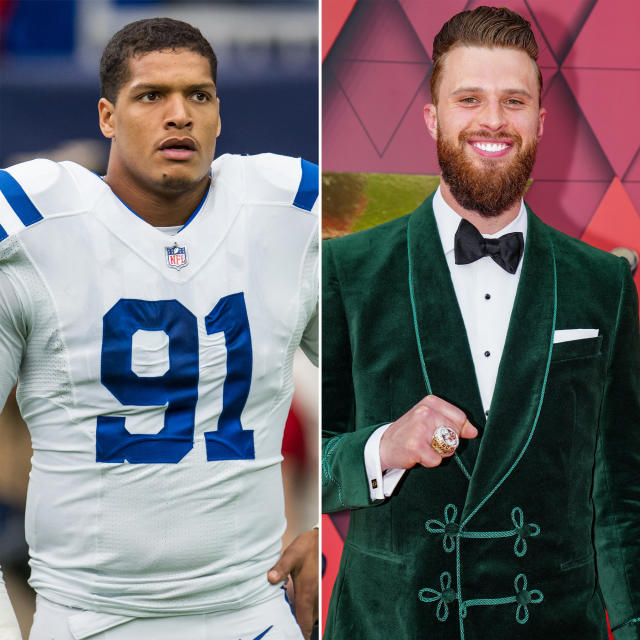:max_bytes(150000):strip_icc():focal(749x0:751x2)/Isaac-Rochell-Harrison-Butker-051724-49951b71e18145bcbabd4666fa80133c.jpg)
In what might be the roast that sparks the most fire, Isaac Rochelle, defensive end extraordinaire and part-time stand-up comedian, finds himself on the chopping block after delivering a scorching takedown of fellow NFL player Harrison Butker. The incident, which unfolded during what was supposed to be a friendly charity roast, may just cost Rochelle his spot in the league, proving that in the NFL, you can tackle a quarterback but you better not tackle a teammate’s reputation.
It all started at the annual “Gridiron Grins” charity event, where NFL players swap their helmets for mic stands and try their hand at comedy. Isaac Rochelle, known for his quick feet and quicker wit, decided it was the perfect opportunity to skewer the league’s personalities. But when it came to Harrison Butker, Rochelle may have grilled a bit too fiercely.
“Now, we all know Harrison as the guy who can kick the ball from here to high heaven,” Rochelle began, to the amusement of his peers. “But when it comes to tackling the real issues, well, he prefers to kick those down the field too. And by down the field, I mean avoiding them altogether.” Butker, known more for his strategic plays on the field and less for his sense of humor, didn’t take kindly to being the butt of Rochelle’s jokes. Sources close to Butker say he was less than thrilled at being roasted about his ‘sideline’ activities, especially those involving his recent controversial comments at a local university, which have made him a polarizing figure among fans and players alike. While the room filled with laughter, Butker’s expression told a different story, hinting at the brewing storm that was about to engulf Rochelle.
Butker, known more for his strategic plays on the field and less for his sense of humor, didn’t take kindly to being the butt of Rochelle’s jokes. Sources close to Butker say he was less than thrilled at being roasted about his ‘sideline’ activities, especially those involving his recent controversial comments at a local university, which have made him a polarizing figure among fans and players alike. While the room filled with laughter, Butker’s expression told a different story, hinting at the brewing storm that was about to engulf Rochelle.
The NFL, already scrambling to handle PR nightmares, now faces a new dilemma: how to manage Rochelle’s roasting rampage. With the league’s image at stake, insiders suggest that Rochelle’s days might be numbered. “We appreciate a good joke,” an anonymous NFL official said. “But there’s a fine line between a roast and a career toast. Rochelle might have just barbecued his last blitz.”
In the aftermath, the situation escalated quickly. Media outlets pounced on the story, with headlines ranging from “Isaac Rochelle Roasts Himself Out of a Job” to “NFL’s Comedy Night Turns into Career Nightmare for Rochelle.” Social media buzzed with opinions, splitting the NFL community and its fan base. Some praised Rochelle for his comedic talent and bravery to speak candidly, while others criticized him for crossing a line and jeopardizing professional relationships.
In a follow-up tweet, Rochelle seemed unrepentant, suggesting that the league needs more humor, not less. “If you can’t take the heat, stay out of the roast,” he tweeted, a post that went viral with mixed reactions from the public. Fans of Rochelle commend his bravery and comic relief, while others fear his comedic chops could see him chopped from the roster.
This incident raises the question: Has the NFL become the No Fun League? Where once players might jibe each other without consequence, the modern era sees every word weighed and measured, possibly with fines or firings following closely behind. Rochelle’s possible firing paints a stark picture of a league where the helmets are hard and the skins, perhaps, a little too thin.
Moreover, the situation exposes the tension within the NFL regarding player conduct off the field. The league has been trying to project a polished image, especially in light of various controversies involving player behavior. This roast incident has become a litmus test for the NFL’s tolerance towards off-field antics and how they align with its branding efforts. Will the league allow players to express their personalities freely, or will it enforce strict decorum to avoid any potential PR issues?
As the saga unfolds, Isaac Rochelle waits to see if his NFL career might be sidelined for a sack of jokes. Meanwhile, the sports world watches intently, pondering whether the league should lighten up or if indeed, every roast must have its limits. The league’s handling of this situation will set a precedent for future interactions among players, especially in public forums. Will they adopt a more lenient approach towards humor, or will they clamp down, ensuring that the only tackles made are on the field?
Rochelle’s predicament also brings into focus the broader conversation about freedom of expression versus professional responsibility. In an era where every statement can be magnified and scrutinized, public figures, including athletes, must navigate a complex landscape. The balance between staying true to one’s personality and maintaining professional decorum is delicate and often fraught with consequences.
Whatever the outcome, this roast will go down in NFL lore as the one that tested the boundaries of banter and the brittleness of a league balancing humor and honor on the gridiron of public opinion. As players, fans, and officials dissect the incident, it will be interesting to see how it shapes the future of NFL interactions, both on and off the field. The resolution of this controversy might well redefine the limits of locker room humor and the extent to which players can push the envelope in the name of entertainment.

